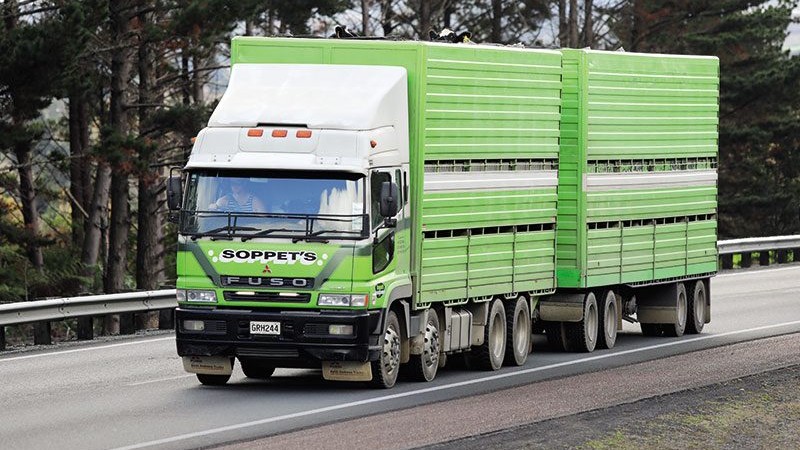
They travelled from as far away as Piopio, Hokitika and even Western Australia to relive the many miles on the road in truck cabs adorned with the bright green livery of Maramarua- based Soppet’s Transport. There were laughs and ‘BS’ all round, a classic scene of old- fashioned country-style hospitality, typical of a traditional rural trucking get-together.
Two of the most important things in life – people and history – were celebrated in the truest sense in early January this year. Twin brothers and North Waikato rural cartage identities Lindsay and Rodney Soppet held a social marking the end of 47 years in business together as Soppet’s Transport.
The event took place at the home of Lindsay’s daughter, Moira, located on the rolling hills of Miranda, overlooking the Firth of Thames. In terms of a venue, it was ideal. Miranda and its surrounds are key areas in the region the brothers built the rural service transport ‘institution’ they led for nigh on half a century.
With its instantly recognisable bright green livery, and quintessential rural carrier’s depot alongside SH2 in rural Maramarua, Soppet’s Transport spoke volumes about what it means to be a business operating in its local community.
Organised by former driver Sam Hooper, the function was attended by family and staff, including those who were there when the last Soppert’s Transport key was hung up in early 2022.
From acorn to oak Twins Lindsay and Rodney Soppet learned from a young age about hard work and how to treat people. They came from a family of 15 (five boys and 10 girls), growing up on the dairy farm parents Arthur and Anne owned on Monument Road, Maramarua, in far North Waikato.
On leaving school, Lindsay worked on his parent’s dairy farm. Rodney went to nearby Te Kauwhata to work on his brother-in-law’s farm before moving back to Maramarua, where he milked cows for local farmer, Glynn Jones..
The early 1970s saw a prophetic shift in occupations, with Lindsay taking on a truck driving role for Peter Hale at Maramarua. Shortly after, Rodney started driving for Taylor Brothers1 at Mangatangi.
Unfortunately, Taylor Brothers fell on hard times after only four to five years, and the twins decided to have a go on their own. They sold their cars and borrowed as much money as they could get their hands on to purchase one of Taylor Brothers’ D750 Series Ford tip trucks, its trailer, stock crates and the all-important carrier’s licenses. Soppet’s Transport began operated in March 1975 at Mangatangi, a picturesque rural farming village inland from the Miranda seabird coast and not a stone’s throw from where the boys had grown up.
Lindsay and Rodney set about getting their business up and running. Unafraid of hard work, they undertook the usual rural transport cartage needs, namely stock, metal, fertiliser, wool and hay cartage. It was supplemented by the cartage of fencing materials and a Friday freight run ex-Auckland for local farmers, shops and hotels. Skillfully managed, the last delivery of the Friday freight run was either at the Red Fox Tavern at Maramarua or the Bay View Hotel in the coastal town of Kaiaua. By all accounts, things could get a bit ‘messy’ after the few drinks that rounded off another long and busy week for the young country carrier.
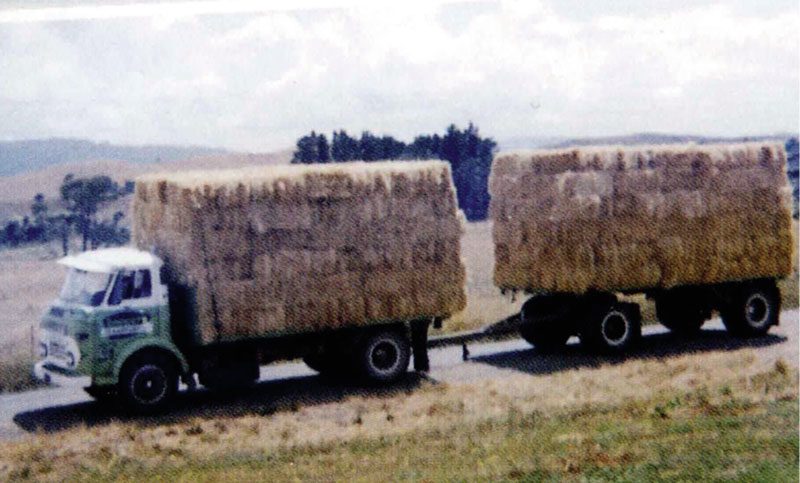

Funny anecdote time. The twins had a 17-foot two-axle trailer that was left behind in Kaiaua on more than one occasion. Lindsay would get in his Holden Torana SL and go and retrieve it. Taking the tow ball off the car, he would insert a large nut and bolt through the towing eye of the trailer and into the car tow bar, then tow it back to Maramarua. Of course, it was brakeless and lightless.
The trusty Torana was also used as a salvage car. It towed a broken-down truck back from Bombay and on another occasion one from Waitakaruru, the neighbouring village about 20km east of home base at Maramarua.
Furniture removal was another line of work undertaken to various places around the North Island. If it could be carted, Soppet’s did it.
As the workload grew, so did the need for more trucks, and a second-hand TS3 Commer was purchased from Pearce’s Transport in Huntly. A third truck followed after a young local guy, Jim Glasgow (‘Jim-Bob’), approached the twins for a job.
They bought another TS3 Commer from T.G. (Tom) Smith at Springdale in the central Hauraki Plains on a Friday, rubbed it down on Saturday, painted it on Sunday, and it was ready for work on Monday. After 46 years, Jim-Bob even remembers the rego plate – EE9398. It doesn’t stop there, though. Other registrations Jim remembers include Soppet’s’ first Dodge – IB8004, and the 1983 Renault – LK5313.
Then came a significant expansion, doubling both the number of trucks and depots. Soppet’s bought the business of local opposition carrier Peter Hale in 1979. His depot is the premises we know today as Soppet’s on the side of SH2, Maramarua.
Stock was always a large part of the Soppet’s Transport workload. In 1985, when the meatworkers’ eight-week strike caused disruption to many operators, Lindsay and Rodney were classed as owner-drivers and, as such, allowed to continue carting into the freezing works.
The green trucks were common in all the local sale yards: Kopu, Coromandel, Colville, Coroglen, Tuakau, and Paeroa, plus they hauled a lot of stock off Waiheke and Motutapu Islands to the Tuakau saleyards, Auckland abattoirs, and further afield to Stevenson’s Lochinvar Station on the Napier-Taupo Road.
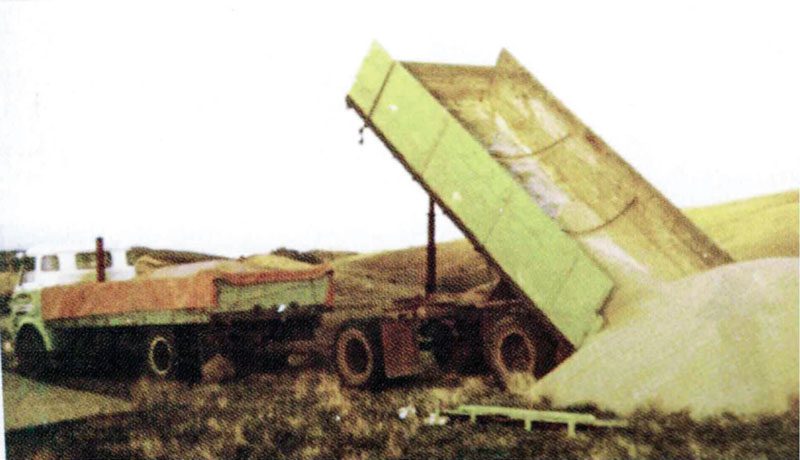
With hard work and determination, the workload and fleet size kept expanding. As the family built their business, the local farming community also rallied around them to provide a loyal customer base, forging long-standing business relationships that became long-standing friendships.
Over time, new companies would pop up in the area, ready to have a go at running the brothers out of town, but loyalty is strong in small rural areas.
That loyalty ran in both directions. The Soppets have always been community-minded, loaning out equipment for various jobs around the district as well as being great sponsors of the Maramarua Rugby Club, Junior Boys Rugby, the Maramarua and Mangatangi schools, among other local community organisations.
In the early 1990s, squash growing became popular around Mangatawhiri, and the Hauraki Plains to the immediate southeast. Consequently, three Scanias, part of the local Miles Pope fleet, were taken over, increasing the Soppet’s fleet count to 12, the most it ever got to.
The squash work entailed collecting crops from the paddocks, carting them to the grading sheds in Mangatawhiri, and then on-carting them to the wharves in Auckland, Whangarei, Tauranga and Napier.
Good folk, hard cases, great times, and nicknames
Soppet’s Transport was a family business to the core. Lindsay’s wife Shirley and Rodney’s wife Karen worked equally hard to ensure the rural service enterprise was successful.
Generally, Rodney looked after the day-to- day organisation. Lindsay handled the finances, Karen covered the phones and RTs, and Shirley managed the accounts.
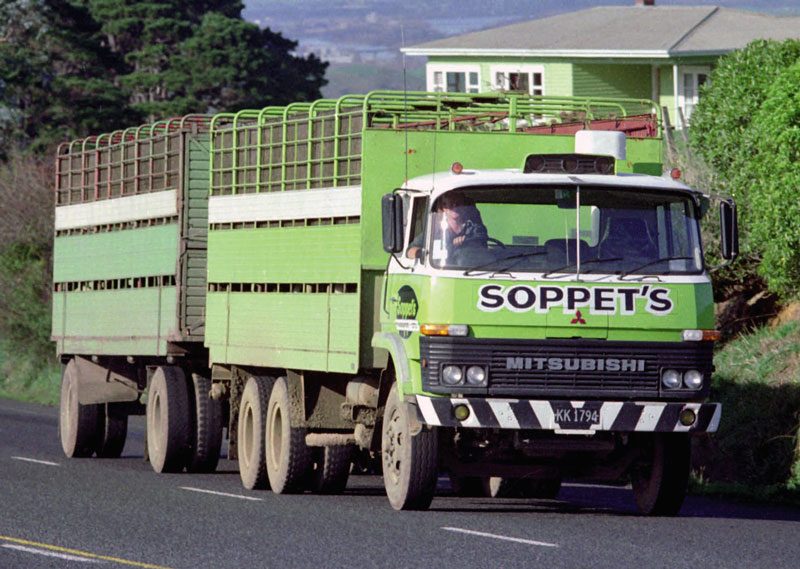
Tragically, Shirley died in February 2013 after a farm accident, leaving many broken hearts among the Soppet whanau and staff current and former.
Lindsay’s daughter Moira, who had attended the Tuakau stock sales earlier on, re-joined the business after her mum’s passing to take on the accounts role, a job Shirley still did by hand at the time of her death. A year into Moira’s tenure, a computer was purchased with the monthly invoices now printed on green paper – what other colour could it be?
Lindsay’s son Hamish joined the company in 1998, as soon as he got his heavy traffic licence at 18. With rural transport in his genes, he helped with operations whenever Rodney was away. Rodney’s son Kelvin also joined later, after his OE and pursuing other interests.
As is so often the case, big businesses can learn so much from small. Defining ‘family’ in the Soppet’s Transport vein is a difficult endeavour as anyone who had given part of their life to help the Soppets in business were treated with respect and always welcome, even if they’d decided to move on. No bridges were ever burnt.
As such, the social side of the company was a big part of life, and on Saturdays, when the trucks were washed and serviced, the twins would take the keys out of the drivers’ cars so they couldn’t take off before refreshments came out and the weekly ‘bullshit and banter’ session started.
After they took over Peter Hale’s fleet, with the encouragement of the then- Red Fox Tavern’s owner, the late Chris Bush, the twins opened a social club in a room on the side of the truck shed. Chris must have regretted his idea because it became a popular local watering hole, the scene of many a late night, invariably taking business away from the Red Fox.
The tales and recollections that come from 47 years in rural cartage flow like tap water.
Jim Glasgow remembers going to load peat late one afternoon out the back of Ngatea on the Hauraki (Kopuatai) Peat Dome. As was common in the soft peat fields, he got stuck. They tried everything to get him towed out, but all to no avail, even after the twins had arrived to cast their eye over the situation. In the greatest traditions of remaining calm, they all retired to the Ngatea Hotel to establish plan B. Returning to the truck the next morning, it was mission accomplished with ease, and the truck was successfully retrieved from the peat. It’s amazing what a few beers can achieve.
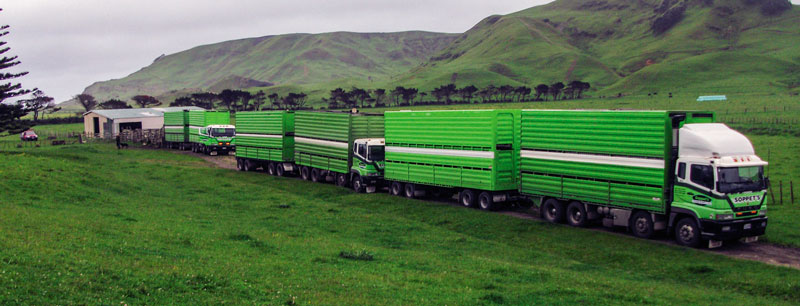
Then there’s the great faulty-steering tale from the Waiheke days. On one of the ferry trips in the 1980s, driver Neil Ryburn (who went on to own his own trucking business at Rangiriri) got tangled up with good-old island hospitality. Having travelled over on a Subritsky’s barge at about 9am to pick up a load of sheep at Pie Melon Bay, he found himself loaded with time to kill before the barge returned. Neil was shown around the farm and hydroponic sheds by the farm’s American owner.
‘Refreshments’ were generously supplied before the decision was made to head down to the Oneroa pub for lunch and a few more ‘raspberry and lemonades’.
Although Neil was somewhat lubricated by the time the barge arrived back, the truck’s steering did not appear to be, with Neil having a hell of a job trying to back the unit onto the barge. The skipper ended up telling him to drive it on forward so he could keep to his timetable. Neither was the bracing sea air on the journey home enough, with a major act ensuing at Half Moon Bay in attempting to back it off.
Nicknames and trucking go together like beer and jandals. As a rule, back in the day people didn’t wander too far. It was common when you bought a business for the existing staff to all come across, and oftentimes, past staff might return to help out the new owners.
One such driver was Kevin Sturzaker (‘Sturzy’), who had previously driven for Ray Harvey (see right), and came into the fold after the 1979 purchase of Peter Hale’s operation.
‘Sturzey’ became known as ‘Uncle Buck’, a reference to the 1967–1971 TV show, The High Chaparral, on account of his calming influence on the young guys – but not on himself by all accounts.
Any young blood entering the trucking world is normally oblivious to those watching and waiting for that one incident – or personal trait – that will earn them a lifelong moniker. According to some of the older drivers, Sam Hooper used to change gear about 10 times between the wash pad, the back of the yard and the fuel pumps out the front. It earned him the nickname ‘10-speed’. Sam reckons it’s because the Dodge he drove had a 10-speed Roadranger, but who’s going to argue with the older and the wiser?
The late Lloyd Ramanui was a young, keen fellow who was tagged ‘Brown Shoes’. The pair became ‘10-speed and Brown Shoes’, after the popular crime-fighting duo in the early 1980s TV show, Tenspeed and Brown Shoe.
Sam Hooper is a superb example of just how much truck driving is a passion. If there’s diesel in your veins, nothing else matters. A car painter at the Toyota assembly plant in Thames, in 1980 he earned $12 an hour, but wanted to be a truckie. He started at Soppet’s that same year on $7 an hour. And how history pans out, with Sam today the quality of operator every young up-and-comer should aspire to be.
Then there’s the tale of Ryan Merrett. As a five-year-old, the local lad told Lindsay he was going to drive for Soppet’s when he was old enough, to which Lindsay replied, “We’ll not be around by then!”
Of course, they were, and they helped Ryan get his heavy traffic license, after which he stayed on for 10 years, only finishing up late in 2022.
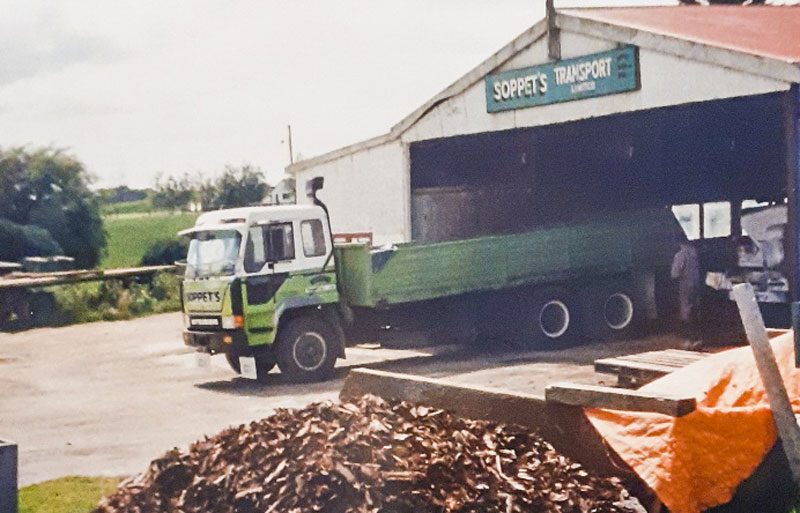
Do unto others
Working with, and having trust in other carriers, proved invaluable for the Soppets. A good example was when heading north to the AFFCO meat works at Morewa, they would stop and fuel up at Somners Transport in Waipu. The drivers knew the diesel pump key was kept on the shelf in the smoko room and would leave a note with how much fuel they put in. This system was repaid when Somners headed south, with their trucks fueling up at Soppet’s’ Maramarua yard.
Other operators they had close working relationships with included Kenny McDonald and Te Akau Transport when carting stock, and Jacksons Road Haul in Auckland, with lime and fertiliser cartage.
They also had great relationships with their suppliers. Norm Fredrickson, who had an engineering workshop in Mangatangi, was always available 24/7 to keep the green trucks’ wheels rolling, while William Gill & Sons in Huntly was the main supplier of trucks, evidenced by the Commers, Dodges, and Mitsubishi marques that formed the backbone of the fleet during its 47 years of operation.
One day, the twins went to pick up one of the trucks from Gills, there for a service and COF. On arrival, they were told there was some good news and some bad news. Thinking the worst, that the truck had failed its COF and a large repair bill awaited, they were surprised when told it had passed. The other news was a new cab and chassis was being prepared for them. There hadn’t been any previous discussion about a new truck being needed, but there it was. “Take it home and put it to work. Financial details will be talked about later,” said Brian Gill, son of founder William. The trust and respect between Soppet’s and Gills lasted until the end.
Stock crates were another necessity in the Soppet’s operation, and its supply relationship here started with Barry Gordon at Nationwide Stock Crates at Te Kauwhata telling them one day that their crate wasn’t worth repairing. “But don’t worry,” he said. “We have already started building a new one and will ring you when it’s ready to pick up.” Once again, finance details would be sorted out later.
When Barry’s brother, the late Michael Gordon (‘Marmite’), who also happened to be Rodney and Lindsay’s brother-in-law, started Delta Stock Crates, he did much the same. When he was still operating out of Te Kauwhata, he rang the twins and suggested they buy a welder. He would then come over on the weekends and strip the old wooden boards off the crates and weld steel sides on them to comply with the new stock crate regulations – everyone going the extra mile to help make things happen and build relationships based on trust and service.
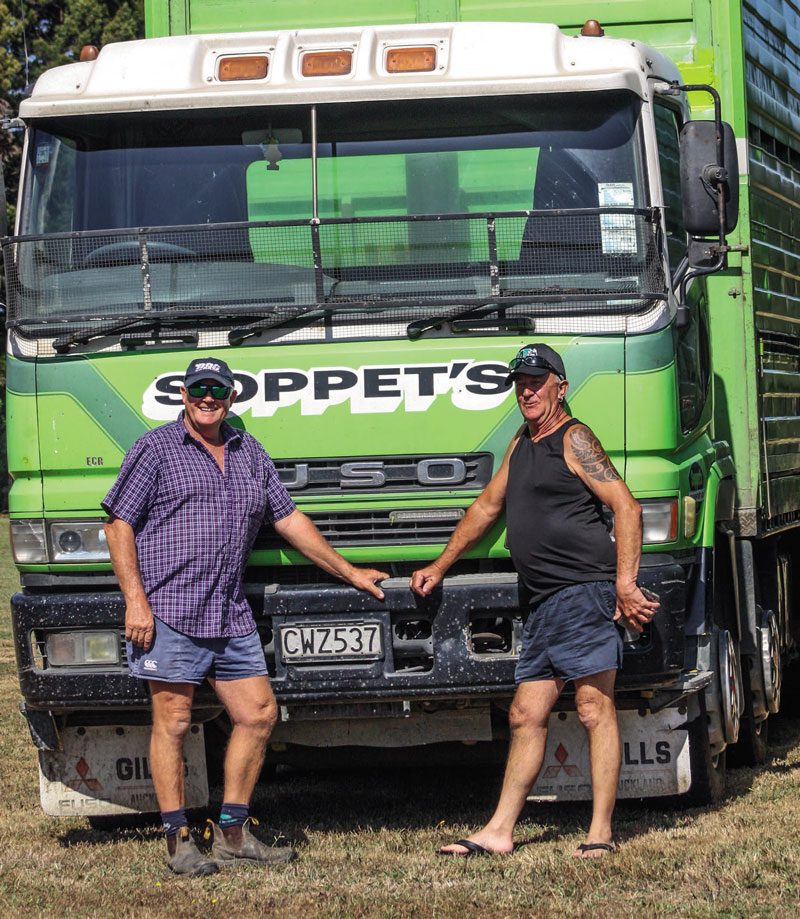
Rural to the core
The hay-making season was a busy time of year with thousands of classic two-string bales moved, all hand-loaded. It was a great opportunity for the young men of each area to earn money and gain work experience.
Lindsay and Rodney speak highly of the hay-making gangs they had working for them over the years and always liked their workers to be well looked after. In that vein, they greatly appreciated the farming families who put on a meal and refreshments at the end of each job. There was one notable occasion where their own natural leadership meant they lucked out. At the end of a big hay job, the farmer’s wife put on a beautiful roast meal. The twins hung back, ensuring the workers were fed first, only to find the bones were bare when they turned up, plate in hand. In typical Soppet style, they both said, “They deserved it more.”
A family business through and through, Karen and Shirley also provided meals for the gangs when they got back to their respective depots; Karen at Maramarua and Shirley at Mangatangi.
The purchase of the Peter Hale business brought bulk spreading into the fold. Lindsay became the main spreader driver, with the late Les Jamieson also sharing the duties.
Lindsay earned himself a reputation as a fearless operator who pushed the boundaries on more than one occasion. Melvyn Davies, a diesel fitter born and raised in Britain and a true character of the local transport scene, was once heard to say of Lindsay’s escapades, “That Lindsay Soppet, he’s bloody mad he is in that spreader…mad as a hatter.” A comment followed by Melvyn’s signature raucous laugh and cheery whistle.
Various makes were deployed in the spreader role over the years, including Commer, Bedford, Isuzu, and Mitsubishi. Although Lindsay always succeeded unscathed, the same couldn’t be said of his charges, with a TK Bedford, an Isuzu, and a Mitsubishi all coming off slightly the worse for wear at different times from the boss’ hillside shenanigans.
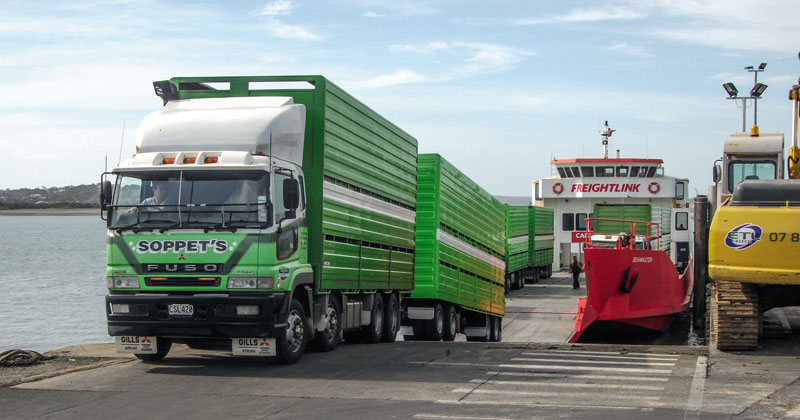
“T81 and T82 to Soppet base – over and out!”
(Lindsay and Rodney’s RT call signs)
The stories and tales would last for days, but at the end of the journey, it’s not what you did that people necessarily remember, it’s how you went about it. And that’s what this story is about.
At the January gathering this year, there were two strong themes associated with the Soppet family, spoken to with passion by all present. Firstly was the work ethic instilled by the twins on everyone who worked there. Second, and most appreciated by all, was being part of the Soppet ‘family’, whether a current employee or past. That you stayed part of that family no matter how many years earlier you had left the company was hugely valued, and evidenced not only by the number of people present but by the emotion in many speeches.
Lindsay and Rodney turn 70 this year. After 47 years of service and commitment to the trucking industry and their local communities, it is clear that anyone who knew, worked for, or did business with them, only wishes the best for two great blokes and their families as they all enjoy a well-earned retirement.
Soppet’s Transport was sold to Don Wilson of On Road Transport (ORT) on 28 January 2022.
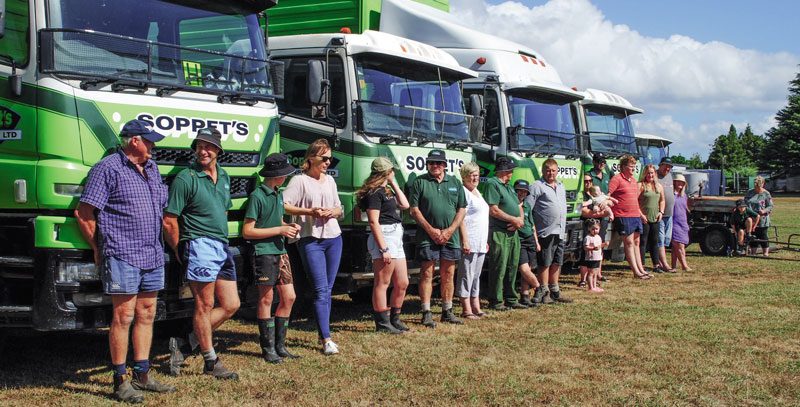

The dynamic duo
Ray and Margaret Harvey started out on their own with one truck in 1950 from the premises that would become the home of Soppet’s Transport years down the track. Ray had turned down a ballot farm for returned soldiers after World War II, using his rehabilitation loan money to start a trucking business.
In the early years, stock was carted to and from the Pokeno and Mercer railway stations. When a big stock shift was on, Ray would work for as long as his eyes would stay open, then he would call in at home with the truck loaded, and while he caught some shut-eye, Margaret would take the load to the Railway Station, unload, and return for Ray to continue on.
On one occasion, Ray and Margaret had 15 loads of sheep and cattle to shift to the various freezing works in Auckland. The loads had to be done in succession – about three and half days of continuous work.
To achieve this assignment, they did as married couples did in those days and worked as a team. Both would load up, then Ray would do as many loads as possible before needing some sleep, in which case, Margaret would drive the truck back while Ray jumped in the passenger seat for a sleep. Luckily, they would have had the luxury of calling in at home for meals and showers to freshen up, and then keep on going.
They built their business up to a tidy four-truck operation before selling out to Peter Hale in 1967.
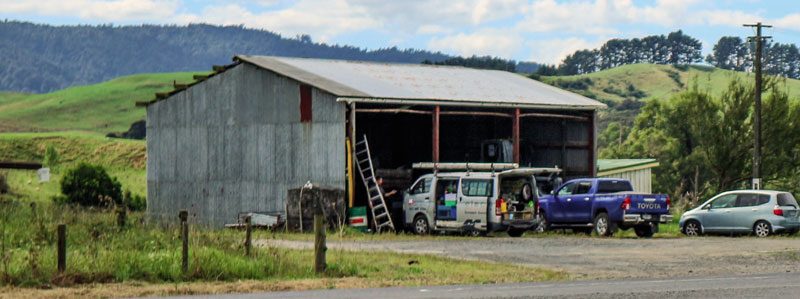

The little village that could
Are you a young fella or lass, looking for the perfect place to start a successful transport company? Then it might pay to investigate picturesque Mangatangi, sitting amid rolling hill country about 40km to the southeast of Auckland, for it could well be one of the places where transport gods reside.
There are two innocuous buildings in the village – sheds you wouldn’t really give a second glance today. One is in the village proper, on Kaiaua Road, the last building on the right as you head out of town toward the seaside village from which the road gets its name. The other, an even more inauspicious structure, sits on the junction of Miranda and Monument Roads at the foot of the hill, leaving Mangatangi to the east. Let’s start with the latter.
Roy Pipen started a trucking company there back in 1935. Then in 1940, Wattie and Meryle Bath bought out Roy and built their business into a strong seven-truck fleet. Interestingly, a recent discovery exercise revealed Wattie Bath carted the first load of manure out of the Challenge Fertiliser Company at Onehunga in 1940.
Wattie passed away in November 1968. Meryle continued to operate the business until it was sold to a couple of local farmers – the Taylor brothers – in 1970. Of course, we know how history panned out from here. It was Taylor Brothers that Rodney drove for, and that he and Lindsay would eventually take over to form Soppet’s Transport.
Back now to the shed and house at the top of the hill, in Mangatangi itself.
Jos de Jong started up a transport business there before World War II. A lovelier bloke you would not meet. Interestingly, Jos only passed on in late 2022 at the great age of 103. Readers might remember the article I wrote on the celebration of the late Eric Wilson’s 100th birthday in 2019 (‘100 Not out’ – New Zealand Trucking, August 2019). Jos drove himself to that event at the age of 99.
The depot was later owned by R.W. Troughear, which had its coal trucks domiciled there. L.W. Bonney & Sons then took over in the mid- 1950s, sending one Neil Otway from their Papatoetoe depot down to run it. Neil eventually bought the trucks and licenses off Bonney, renaming it Coal Lines. Of course, Neil went on to form Trans Otway, a company that ran 120 trucks at its peak and operated throughout New Zealand.
Ian and Bruce Hall then took over the premises from Neil in the early 1960s to form A.B. & I.B. Hall, amassing a seven-truck fleet in its distinctive orange-and- khaki colour scheme. The fleet included spectacular examples of International’s 4300 bonneted Transtar.
Ian sold out to his brother Bruce in 1969, and in the early 1970s, Bruce moved to Papatoetoe to start Hall’s Refrigerated Transport. The brothers’ penchant for unique liveries certainly played a role in Bruce’s company achieving an iconic status – it’s ochre base colour instantly recognisable the nation over. The Halls brand itself has long endured on our trucking landscape, still prominent in the ownership of Talley’s Group today.
Bruce sold the coal trucks to Murray Goodall in the neighbouring district of Managatawhiri. Murray owned Pokeno Machinery, importing heavy US trucks and converting them to right-hand-drive for the local market.
After roughly 18 months in business, Murray sold to Barry Cronin from Tamahere. Cronins ran trucks from Mangatangi for a short period before selling the truck depot and houses to Willie Wanoa in August 1986, where it became home to his Wanoa Buses business until 2013.
They may be humble premises, but they are also home to some of the country’s great road transport names. If their walls could recall the tales of those who have passed through, would we not be hanging on their every word?








